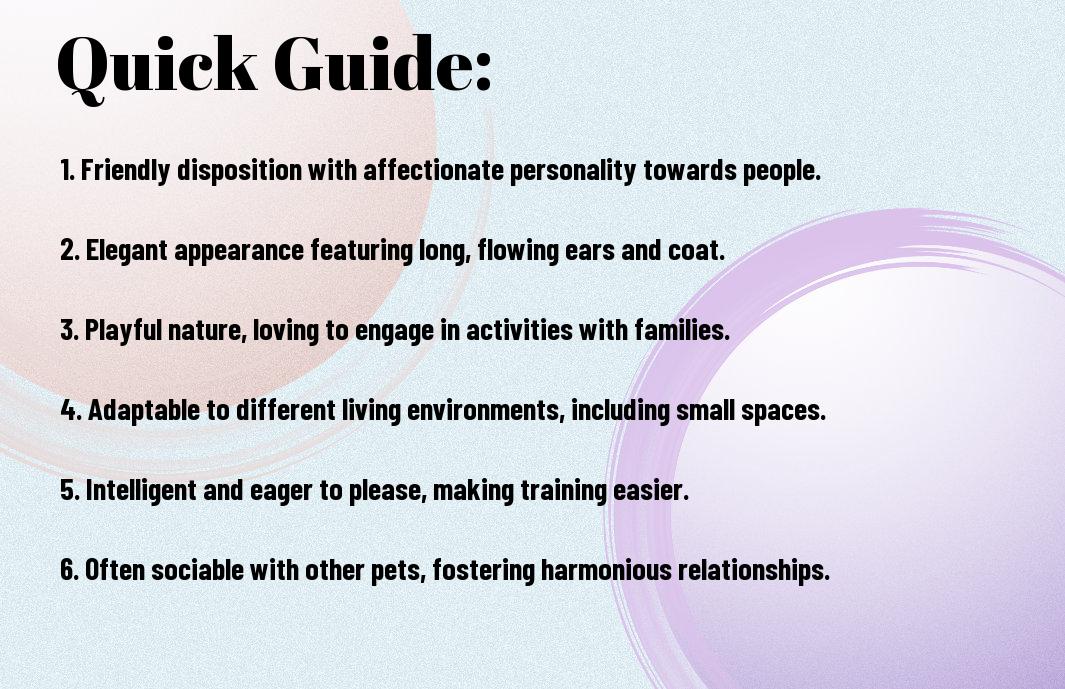I’ve worked with numerous breeds, but the Cavalier King Charles Spaniel stands out. As you consider bringing one home, I want to share key characteristics that define this breed. You’ll notice their gentle nature and affectionate personality, making them perfect family pets. However, it’s important to be aware of potential health issues, such as mitral valve disease, to ensure your pet leads a happy, healthy life. I’ll guide you through the unique traits that make this breed so beloved, helping you decide if they’re right for your family.
Key Takeaways:
To understand what makes the Cavalier King Charles Spaniel a beloved breed, consider the following points:
- The friendly nature of the Cavalier King Charles Spaniel is one of its defining traits, making them excellent family pets and companions.
- The breed’s affectionate personality means they thrive on human interaction and do not do well when left alone for long periods.
- Cavalier King Charles Spaniels are known for their playful yet adaptability, making them suitable for both active and relatively sedentary lifestyles.
- The physical characteristics of the Cavalier King Charles Spaniel, including their moderate size, floppy ears, and long coat, require regular grooming to prevent matting and tangling.
- Their health is a significant concern, with genetic issues such as mitral valve disease and syringomyelia being prevalent, emphasizing the need for responsible breeding practices and regular veterinary check-ups.
Characteristics of the Cavalier King Charles Spaniel
A thorough understanding of the Cavalier King Charles Spaniel’s characteristics is imperative for any dog owner. I have found that their unique traits make them a beloved breed.
Physical Traits
Now, when it comes to physical traits, I notice that the Cavalier King Charles Spaniel has a compact, gentle face and a moderate size.
Temperament and Personality
On the other hand, their temperament and personality are friendly and gentle, making them a great companion for you and your family.
Physical characteristics, such as their flat face, can lead to breathing difficulties, so I make sure to monitor their health closely. As I have learned, their affectionate nature means they thrive on human interaction, and with proper care, they can be a wonderful addition to your family, bringing joy and love into your life.
Types of Cavalier King Charles Spaniels
The Cavalier King Charles Spaniel has several types, including:
- English
- American
I find that you can learn more about the Cavalier King Charles Spaniel Dog Breed Information.
| Type | Description |
|---|---|
| English | Originated in England |
| American | Popular in the US |
| English | Known for gentle nature |
| American | Recognized by AKC |
| Both | Make great pets |
Assume that you will find the perfect type for your family.
English Type
Clearly, the English type is known for its gentle and affectionate nature, making them a great addition to any family, I think you will love their friendly personality.
American Type
For those who prefer a more energetic companion, the American type is a great choice, with their outgoing and playful nature, I believe you will enjoy their company.
Cavalier owners often note that the American type is more adaptable to different living situations, making them a great choice for city or country dwellers, I find that their small size and gentle nature make them a great fit for many families, and as you consider bringing one home, I want to emphasize the importance of proper care and attention to ensure your new companion leads a happy and healthy life.
Factors That Define the Breed
Many characteristics set the Cavalier King Charles Spaniel apart, including:
- gentle nature
- friendly temperament
. As I investigate into the specifics, you’ll see what makes this breed unique. The breed’s distinct traits make it a beloved companion.
Historical Background
Bearing a rich history, the Cavalier King Charles Spaniel has its roots in European royalty. I find it interesting to learn about your desired breed’s past, which is marked by loyalty and affection.
Breed Standards
Behind the breed’s development lies a complex set of standards, shaping its physical and behavioral characteristics. As I explore these standards, you’ll understand what to expect from your Cavalier King Charles Spaniel.
That being said, the breed standards emphasize the importance of a moderate size, proportionate features, and a gentle disposition. As you consider bringing a Cavalier King Charles Spaniel into your life, I encourage you to learn about potential health issues, such as mitral valve disease and syringomyelia, to ensure you can provide the necessary care and attention to your pet.
Tips for Choosing the Right Cavalier King Charles Spaniel
Your search for the perfect Cavalier King Charles Spaniel begins with considering factors like temperament and health. I suggest you:
- Assess the puppy’s energy level
Perceiving the right characteristics will help you make an informed decision.
Research and Preparation
Accordingly, I advise you to gather information about the breed and its needs, ensuring you’re prepared to provide the necessary care and attention.
Meeting the Puppy
Once you’ve found a potential puppy, I recommend observing its behavior and interaction with you and its surroundings.
King Charles Spaniels are known for their friendly and affectionate nature, so I look for a puppy that exhibits these positive traits. As I interact with the puppy, I watch for any signs of aggression or fearfulness, which can be red flags indicating potential behavioral issues. I also check for any visible health problems, such as eye or heart issues, which are common in this breed. By being diligent and thorough, you can find a healthy and well-adjusted Cavalier King Charles Spaniel to join your family.
Step-by-Step Guide to Caring for Your Cavalier King Charles Spaniel
All aspects of care for your Cavalier King Charles Spaniel can be broken down into:
| Task | Description |
|---|---|
| Daily Walks | 30-minute walks |
| Grooming | Weekly brushing |
Nutrition and Diet
Even with a balanced diet, I ensure your Cavalier King Charles Spaniel gets high-quality food. You should monitor food intake to prevent obesity.
Exercise and Health
Clearly, regular exercise is vital for your dog’s overall health. I find that daily walks and playtime help prevent health issues.
Caring for your Cavalier King Charles Spaniel’s health involves regular veterinary check-ups and monitoring for signs of illness. As I’ve learned, mitral valve disease and syringomyelia are common health issues in this breed, so it’s vital to work with your vet to prevent or manage these conditions and ensure your dog lives a long and happy life.
Pros and Cons of Owning a Cavalier King Charles Spaniel
Not every dog breed is suitable for every owner, so I’ve broken down the pros and cons of owning a Cavalier King Charles Spaniel into the following table:
| Pros | Cons |
|---|---|
| -friendly temperament | prone to health issues |
| gentle nature | requires regular grooming |
Advantages of Ownership
The benefits of owning a Cavalier King Charles Spaniel are numerous, and I find their loving and affectionate nature to be particularly appealing, making them an excellent addition to your family.
Disadvantages to Consider
Any potential owner should be aware of the potential health risks associated with this breed, including mitral valve disease and syringomyelia, which can impact your dog’s quality of life.
Advantages of owning a Cavalier King Charles Spaniel are often overshadowed by the significant health concerns that can arise, and as a responsible owner, I believe it’s necessary to be aware of these potential issues and take steps to mitigate them, ensuring your dog leads a happy and healthy life, and I strongly advise you to consult with a veterinarian to discuss the best ways to care for your Cavalier King Charles Spaniel.
Final Words
With these considerations, I conclude that the Cavalier King Charles Spaniel’s unique traits are truly special. As I reflect on their gentle nature, I believe you will find them to be wonderful companions. I am confident that their affectionate and playful personalities will capture your heart, making them an excellent choice for your family pet. You will undoubtedly fall in love with their charming characteristics, and I highly recommend getting to know this lovely breed.
FAQ
Q: What is the origin of the Cavalier King Charles Spaniel breed?
A: The Cavalier King Charles Spaniel is an ancient breed that originated in the United Kingdom, specifically in England, where they were bred as companions for royalty. Their history dates back to the 16th century, and they were favored by King Charles II, from whom they got their name.
Q: What are the distinctive physical characteristics of the Cavalier King Charles Spaniel?
A: The Cavalier King Charles Spaniel is a small to medium-sized dog with a moderate build. They have a flat face, large eyes, and long ears. Their coat is moderately long, with a silky texture, and comes in four main colors: Blenheim (chestnut and white), Tricolor (black, white, and tan), Black and Tan, and Ruby. Adult dogs typically weigh between 10-18 kg (22-40 lbs) and stand about 30-33 cm (12-13 inches) tall at the shoulder.
Q: What is the temperament of the Cavalier King Charles Spaniel like?
A: Cavalier King Charles Spaniels are known for their gentle, affectionate, and playful personalities. They are friendly, outgoing, and excellent with people, making them great family pets. They are also good with other animals, especially if socialized from an early age. They are relatively easy to train, as they are intelligent and eager to please, but they can be somewhat stubborn at times.
Q: Are Cavalier King Charles Spaniels prone to any specific health issues?
A: Unfortunately, Cavalier King Charles Spaniels are prone to several health issues, including Mitral Valve Disease (a heart condition), Syringomyelia (a neurological condition), and Cervical Spine Instability. They can also be prone to obesity, so monitoring their diet and ensuring they get regular exercise is important. Regular veterinary check-ups and genetic testing can help identify these issues early on.
Q: Do Cavalier King Charles Spaniels require a lot of grooming?
A: Cavalier King Charles Spaniels have a moderate grooming needs. Their coats need to be brushed several times a week to prevent matting and tangling, and they should be bathed every 2-3 months. Their ears and eyes need regular cleaning, and their nails should be trimmed regularly. They also require occasional trimming around the face, feet, and tail to keep their coat in good condition.
Q: Can Cavalier King Charles Spaniels adapt to apartment living?
A: Yes, Cavalier King Charles Spaniels can adapt to apartment living, provided they get regular exercise and attention. They need daily walks and playtime, but they don’t require a large yard. However, they do enjoy outdoor activities and will appreciate opportunities to run around and play off-leash in a securely fenced area. With proper exercise and training, they can thrive in a variety of living situations.
Q: How long do Cavalier King Charles Spaniels typically live?
A: The average lifespan of a Cavalier King Charles Spaniel is between 10-12 years. However, with proper care, nutrition, and regular veterinary check-ups, some may live up to 15 years or more. Factors such as diet, exercise, and health conditions can all impact an individual dog’s lifespan, so it’s crucial to prioritize their health and well-being from an early age.



